Driving the Future

FOREWORD
In recent years, Nepal has seen an increase in women eager to pursue higher education, professional careers and business more than ever before. However, many women in Nepal, especially those from excluded and marginalised groups, often have very limited access to economic opportunities and resources. Patriarchal social norms often keep women in traditional, unpaid and home-based work. Women’s work and their contribution to the economy tend to remain informal, unappreciated and unrecognised, with little opportunities to participate in formal and sustainable businesses or gainful employment. This situation forces many Nepali women to seek employment opportunities abroad through unscrupulous recruiting agents, which often exposes them to risks of human trafficking, sexual abuse, forced labour and physical exploitation. Women who return to Nepal after working abroad are also regularly subject to discriminatory practices, shame and stigma, regardless of the nature of work undertaken when abroad. The uneven distribution of unpaid domestic and care work, discriminatory social norms and structural barriers such as mobility restrictions, gender pay bias, and concerns about safety and security of women in public spaces including transportation, also impact women’s ability and motivation to work outside the home. The economic empowerment of women is a complex and multi-dimensional change process which requires a holistic approach from macro-level gender responsive policies, to increased economic opportunities for individual women.
UN Women and the Government of Finland are committed to advancing gender equality and women’s empowerment (GEWE) by creating opportunities, enabling environments and providing safe spaces for women to grow, progress and achieve economic empowerment. In this context, the Advancing Women’s Economic Empowerment (AWEE) Programme, implemented from 2015 to 2019, under the leadership of Nepal’s Ministry of Women, Children and Senior Citizen (MoWCSC), reached over 2,000 women from excluded and marginalised groups, and helped them expand their opportunities to access improved livelihoods. This was achieved through increased and enhanced leadership capacity of women to participate in politics, and through skills enhancement and business development support to establish themselves as entrepreneurs. Through the programme, it was learned that positive changes in women’s lives are highly contextual and take different forms and processes from one individual to another. In many cases, the empowerment process starts with a small shift in how individual women perceive themselves and how they are, in turn, perceived. This shift can be triggered when women are provided with increased economic opportunities, new vocational skills, selfawareness, information, and space and opportunities for their voices to be heard. The accumulation of such shifts in women’s identities is an arena for social norm change in the country towards broader GEWE.
This coffee table book illustrates the changes in the lives of women who were supported through the AWEE Programme. This book sheds light on some of the most remarkable examples of women who have become influencers and changemakers in their communities. Their stories of resilience, diligence and determination will inspire many.
Wenny Kusuma Country Representative UN Women Nepal
Pertti Anttinen Ambassador Embassy of Finland to Nepal


CONTENTS Credits Photos Merit Maharjan Rocky Prajapati Text Abha Dhital Monica Puri Editor Ashma Shrestha Binit Raj Bana Sadichchha Pokharel





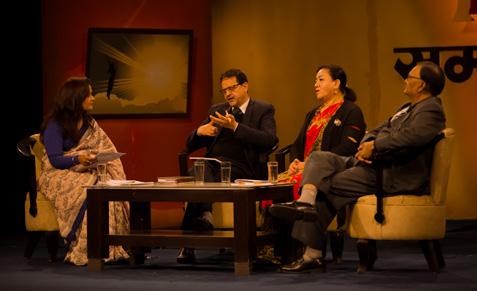



 8. Laxmi Nepali Advocating Change p40-43
7. Ek Maya B.K. An Iron Resolve p36-39
6. Bhumisara Ale Magar Women at the Frontlines p32-35
5. Chandra Kala Rai Never Back Down p28-31
9. Ritu B.K. Speaking Out p46-49
10. Dialogues for Gender Sensitive Plans and Policies p50-52
8. Laxmi Nepali Advocating Change p40-43
7. Ek Maya B.K. An Iron Resolve p36-39
6. Bhumisara Ale Magar Women at the Frontlines p32-35
5. Chandra Kala Rai Never Back Down p28-31
9. Ritu B.K. Speaking Out p46-49
10. Dialogues for Gender Sensitive Plans and Policies p50-52
1. p14-17
p10-13
Shanti Theeng
Driving Economic Independence
p18-21
2. Daimaya Gurung Drive for Success
3. Suku Maya Tamang Skill and Will p22-25
4. Dilu Gajmer In Pursuit of Respect
Economic Opportunities and Increased Income Strengthening Visibility, Collective Voice and Representation Advocacy and Communication for Change
INTRODUCTION
Transforming Lives Through Women’s Economic Empowerment
UN Women’s economic empowerment programme go beyond income generation. It aims to strengthen women’s leadership, voice and agency to demand decent and safe conditions of work and exercise control over their income, mobility, bodies and lives. Bringing about change in women’s lives does not, however, rest on the shoulders of women alone: men’s role in breaking down barriers and stereotypes, sharing care and other responsibilities and actively supporting the voice and leadership of women in all aspects of their lives and organizations is key. This requires transforming discriminatory social norms and deeply rooted patriarchal structures that limit women’s ability to access economic opportunities and strengthening their voice, leadership and agency.
With the support from the Government of Finland, UN Women initiated the ‘Advancing Women’s Economic Empowerment (AWEE) Programme: Ensuring Nepal’s Sustainable and Equitable Development’ in 2015. The programme was implemented in six districts: Sunsari, Kavre, Nawalparasi, Makwanpur, Banke and Kailali under the leadership of the Ministry of Women, Children and Senior Citizens (MoWCSC), Government of Nepal, and in close collaboration with relevant government agencies, civil society organisations and private sector partners.
Taking forward the spirit of Agenda 2030, the programme reached out to women from excluded and marginalised groups: returnee women migrant workers, survivors of human trafficking, conflictaffected women, rural women, women living with HIV and AIDS and home-based workers. In addition to training women to support income generation and leadership, the AWEE Programme also engaged with stakeholders such as national and sub-national governments, the private sector, civil society and communities to address discriminatory social norms and harmful practices.
This coffee table book brings together stories which demonstrate that when women have economic opportunities, families and communities are supportive, and resources (financial, knowledge) are accessible; transformative change is possible. This book is divided into three chapters:
1. Economic Opportunities and Increased Income
2. Strengthening Visibility, Collective Voice and Representation
3. Advocacy and Communication for Change
Cutting across all these chapters is a common theme, that of addressing gender discriminatory social norms, harmful practices and gender stereotypes. The stories included in this book show how these women and girls challenged gender stereotypes and established themselves as leaders in homes, communities and markets.
7
Economic Opportunities and Increased Income

8
Increased economic opportunities and better income security are fundamental to achieving women’s economic empowerment. Income generation was promoted through vocational skills and entrepreneurship development, and formalisation of women’s work. A total of 1,840 women from excluded and marginalised groups were supported through the AWEE programme. Of these, 1,087 women have started or expanded their income generation. This included training and
business development support to returnee women migrants on a non-traditional occupation – electronic-rickshaw drivers. With the increased income capacity, women have built their self-confidence, expanded opportunities and been able to reshape power relations within and outside of their homes. Stories from the field also demonstrated far-reaching benefits, including enhanced security and decision making of women in their homes and communities.
Women’s
937 chose self-employment / entrepreneurship
150 opted for paid employment / salaried jobs
NRs. 6,319
Average NRs. 10,277 per month which ranges from
NRs. 21,000
9
1,087 women from excluded groups started and/or expanded their income generation
earnings through micro-scale home-based production, start-up of micro businesses and paid/wage employment
Driving Economic Independence
“I never thought I’d be able to support my family, and through such an unlikely occupation,” says Shanti Theeng, 27, who currently drives an e-rickshaw in Hetauda, Makwanpur District.
“Due to my lack of educational qualifications, I couldn’t find a job in my locality,” she says. Her husband, Dawa Lama, used to work in Qatar but had to return after the company he worked for shut down. Before her marriage, Shanti had spent two years working in Kuwait as well.

Being self-sufficient makes a great difference in life. It gives you the courage to accomplish anything.
10

11
They struggled to find a decent paying job and whatever they earned was hardly enough—at times even two meals a day seemed a luxury. Therefore, Shanti discussed with her husband that either of them migrate abroad for work. However, Dawa, already disillusioned by prospects abroad, was adamant that they could earn as good a living in their own village. “We have a small child, and I hoped we could get by if we worked hard enough,” Dawa says. Persuaded by her husband`s argument, Shanti reluctantly gave up on the idea.
Fortunately, Shanti had a chance to be a part of an entrepreneurship development programme for returnee women migrant workers implemented by UN Women. The programme trained women to become licensed e-rickshaw drivers.


“I used to think that women weren`t suited for that kind of work,” she says. “But the programme inspired women like me to trust in our abilities and showed us a way to lead a proud life of dignity.”
Things are now looking much better for Shanti and her family. “Being selfsufficient makes a great difference in life and gives me the courage to accomplish anything,” she says. On a good day, Shanti makes USD 16 to USD 18, which amounts to around NRs. 45,000 (approx. USD 410) per month. “The earnings are enough to comfortably provide for us, to raise our daughter, and we can now save for the future as well,” says Shanti.
12
- Shanti with her husband, Dawa, and their daughter
“In the beginning, a female driver on the streets raised many eyebrows,” says Shanti. At times, she even felt like giving up, but Dawa always encouraged her to push on. “The nature of work doesn’t matter,” says Dawa. “A wife is as important to a family as a husband, and when a wife earns, it benefits the entire family.” Empowered by her newfound confidence and continued support from her husband, what other people think and say about her does not bother Shanti anymore.
Shanti’s success is an inspiration to many. Women from her village even approach her for tips on driving, she adds proudly that, “The key to success is to have faith in your abilities and patiently work toward your goal.”

13
Drive for Success
Daimaya Gurung, a 35-year-old single mother, lives with her son in a small rented cottage in Kirtipur, Nawalparasi District. She has spent most of her youth working as a domestic worker in Saudi Arabia and Dubai. “I’ve only passed the eighth grade, and you can’t get a good job without educational qualifications,” says Daimaya. “I was only left with the option of working abroad.”
After returning from Dubai, Daimaya started working as a caretaker at a local primary school. “I have always loved children, so it was a good job and the teachers were supportive,” she says. “But the income was not enough to support my family of two.” It was the principal of the school who informed her about the e-rickshaw initiative. Daimaya immediately signed up for the programme.

Nothing is comparable to the satisfaction of leading a dignified life back in your own place.
14

15
The programme provided the skills Daimaya needed so that she could earn a better living in her village. Other women like Daimaya were provided driving skills training, information and sensitization on gender equality and social inclusion. The training also helped prepare them for the driver’s license examinations.
“It didn’t even take me two weeks to learn to drive the e-rickshaw,” Daimaya says. Since then, she has come to adore her rickshaw.
At first Daimaya wanted to continue working at the school while driving her e-rickshaw, but it would have heavily reduced her daily income. Her monthly salary in the school was only NRs. 4,000 (approx. USD 36). But with the e-rickshaw, she can make as much as NRs. 1,500 (approx. USD 14) a day. She quit her job and started driving the e-rickshaw full time.
“It is good to see women driving e-rickshaws and changing the local’s perceptions of men and women’s roles,” says Dhan Maya Gurung, Daimaya’s regular passenger.
Daimaya’s e-rickshaw is also a school transport service for a few students from a local school. With the number of e-rickshaw passengers only growing in her district, the arrangement has boosted her income significantly.

16
- Daimaya with her son
No matter how tough life might seem at times, things are still better than how they were when Daimaya worked abroad. “Nothing is comparable to the satisfaction of leading a dignified life back here in your own place.”

Whatever she makes in a day, Daimaya always saves half of her earnings. Her aunt is proud of her and is relieved that she has abandoned the thought of working abroad. “Everybody supports my venture here and for now, I’m more than happy to be able to support my son and provide for his needs without worry,” says Daimaya.

17

18
Skill and Will
Suku Maya Tamang, 32, is a proud owner of a tailoring shop in Banepa, Kavre. The shop’s walls, covered in freshly sewn colourful blouses and kurta suits, attests to her popularity as one of the best seamstresses in Banepa.
“Growing up, I didn’t have too many expectations from life. With a polioaffected leg, I had learnt early on that the opportunities would be few and far between,” shares Suku Maya. She shares that her disability affected her not just physically but also emotionally. “Children in the village would make fun of me because I was not like them, and so I didn’t grow up with a lot of confidence.”

19
When you have one weak leg, working on a manual sewing machine is not an easy job. This automated machine has changed my life.
Looking back, she smiles at how far she has come in life. “I have been in the business for seven years now, but the past year has been the best so far.” She is grateful to the UN Women-provided training. “I learnt so much about entrepreneurship as well as saving money. If I was just a tailor before, I now feel like a business woman,” Suku Maya gleams with newly-found confidence.
The training has helped her increase her vocational and entrepreneurial skills. It has also provided her with resources such as a partially automated sewing machine that allows her to work productively and make more money. Since having received the training, her business has grown remarkably, she says. The machine’s efficiency, which matches her ambition, has made her life easier.
“When you have one weak leg, working on a manual sewing machine is not an easy job. This machine has changed my life.” She says as her hands move with speed and finesse as she makes conversation. “It has sped up everything. I can meet shorter deadlines and work more.”
Chandra Maya Nhasiju, a 70-year-old regular patron, who takes the bus to Suku Maya’s shop, says, “There are other tailoring shops in my area, but I like Suku Maya’s work. When she says she’ll meet a deadline she does so and with quality work.”

20
In the last ten years, Suku Maya faced her own series of hardships before reaching where she is today. She was estranged from her husband after he left for Malaysia. “Just nine months into our marriage, I was abandoned,” Suku Maya shares, “I mortgaged my shop to cover my husband’s expenses but he decided to settle with someone else there, while I spent three years paying back his debt with my hard-earned money, all by myself.”
Undeterred, Suku Maya is glad she decided to build a new identity as an independent entrepreneur. She has recently filed for divorce, and now lives with her elderly father. As the primary earner in the family, she is able to pay the rent for both the shop and her two-bedroom flat. Every month she saves up to NRs. 7,000 (approx. USD 64) and manages to indulge in leisurely shopping and cinemagoing on some days. “If I want to go somewhere with my friends, I don’t have to think twice or borrow money from anyone. I am my own boss today.”


21
- Suku Maya with her regular customer, Chandra Maya Nhasiju

22
In Pursuit of Respect
Dilu Gajmer’s son had only turned three when her husband decided to leave her. Distraught, Dilu reached out to her family for support. She has since been living with her 84-year-old mother, her brother and his wife, in Barahakshetra Municipality, Sunsari District.
A decade later, in 2005, when the Maoist insurgency in Nepal was escalating, many single women around Dilu were fleeing abroad. “I had nothing left after my husband abandoned me. Going abroad for work seemed like the only option,” she says.

23
I may not have earned a lot of money in my life, but I am proud that I have earned my share of respect in my community.
Despite toiling in Kuwait for 11 months, she received no payment. The brutish nature of the work also made her terribly ill. She returned home empty-handed.

Back home, Dilu came to know about Pourakhi Nepal, an organization established and run by returnee women migrant workers, which had recently opened its office in Dharan. Through Pourakhi Nepal, she was introduced to the UN Women’s e-rickshaw initiative. Dilu applied for the training along with seven other women in her village.
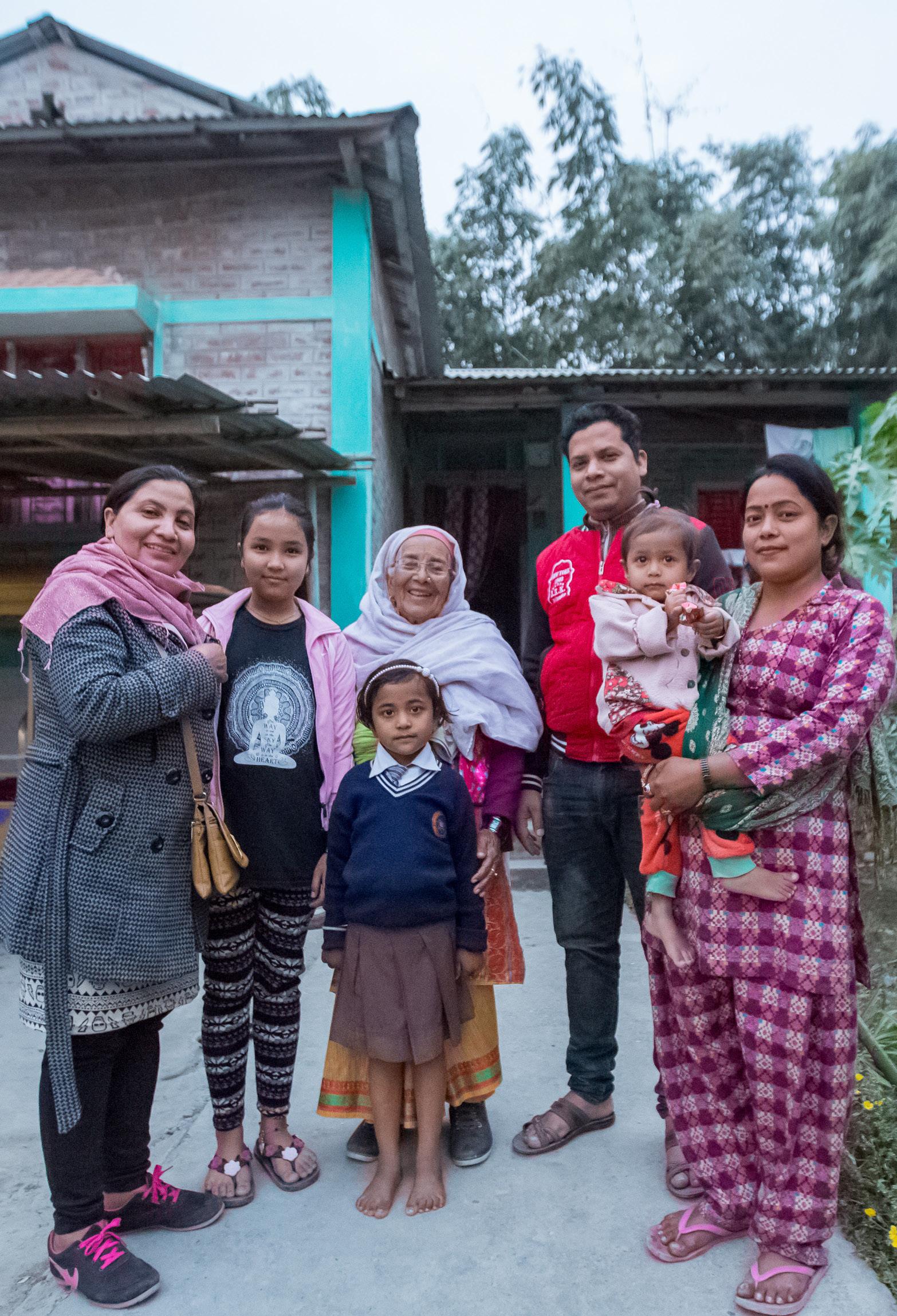
24
- Dilu with her mother, brother, sister-in-law and her nieces
“People used to stare at us in astonishment when we first started driving,” says the 45-year-old who is now a full-time e-rickshaw driver. “But now many passengers themselves support the initiative and prefer to ride our e-rickshaws.”

“She’s always out-and-about,” says Bimala Magar, who has been one of Dilu’s regular passengers for over a year. “Watching her makes me want to earn for myself as well, instead of just staying at home.”
Slowly but surely, Dilu is gradually turning her situation around. Her daily earnings can go up to NRs. 1,000 (approx. USD 9). With her savings, and some help from her son (now 28) and brother, she has set up a small teashop in front of her house—a popular spot for the local college students.
Every day, at around 11 am, she takes out her e-rickshaw and picks-up and drops-off residents of a home for senior citizens and offers free rides to underprivileged women. During the rides, she often provides her passengers with information regarding safe migration.
Interested in Dilu’s success, locals now tend to ask her family for business advice. “People frequently ask me how they can start their own e-rickshaw venture like Dilu’s,” says Hira, Dilu’s brother. “I couldn’t be prouder of what she has achieved.”
Dilu believes that women should focus on their strengths and strive to become self-reliant. “I may not have earned a lot of money in my life,” she says, “but I am proud that I have earned my share of respect in my community.”
25
Strengthening Visibility, Collective Voice and Representation

26
Another focus area of the AWEE programme was promoting women’s collective voice in formal decision making. Women’s participation in decision making enables them to be active and equal participants in development processes to advocate for their needs and hold governments accountable. The programme was conducted over 18 months which included training on gender laws, policies, local planning and development processes, electoral laws and voter education, leadership and negotiation skills, knowledge on the local and
provincial assemblies and local-level planning and budgeting processes. The participants also received mentoring and coaching support to utilise the learnings from the training.
They were also provided with opportunities for network building to influence formal decision-making processes, demand public resources and greater accountability. Of the 180 women who were trained in the leadership development programme, 25 women contested the local elections in 2017.
180 women from excluded groups trained
124 represented in public formal decisionmaking or coordination bodies at the local level
109 joined different political parties
25 contested for various seats in the local government during the 2017 elections
7 out of the 25 were elected as a Ward Vice Chair or Ward Member of a various rural municipalities
27
*The six excluded women’s networks reached through the programme are: returnee women migrant workers, survivors of human trafficking, conflict-affected women, rural women, home-based workers and women living with HIV and AIDS.
Never Back Down

Chandra Kala Rai, at 33, exudes confidence and is well-known for showing kindness in her community at Railway Chowk, Sunsari District.
“People go to her with all kinds of problems, from neighbourhood squabbles to cases of domestic violence,” says local Kamala Rai.“I’m also thankful to her for helping me raise funds when my daughter was diagnosed with cancer.”
28
Ours is a society still greatly influenced by patriarchal values, so women need a stronger resolve and voice if they are to stand on equal ground.

29
Chandra Kala’s attitude towards life comes from a lifetime of overcoming hardship. Her father passed away early in her childhood leaving her family on the verge of destitution. At 20, Chandra Kala left for Kuwait in search of better opportunities, only to be sold off, sexually assaulted and harassed while working as a domestic worker. Her fighting spirit kept her from more harm, and four years later, she returned to her family.
“I never thought of being open about my past and the harrowing experiences I had to face,” says Chandra Kala, “I used to think that if people knew, it would bring me shame.”
Upon her return, Chandra Kala decided to take to the political stage to help women who had faced similar hardships as her.
“I realised that my experience could be a lesson for other women who are unaware of the challenges that await them abroad.”
She found out about UN Women’s leadership development programme and signed up for it. Not only did Chandra Kala improve her leadership skills, but she also increased her knowledge of Nepal’s political system.


“Before the programme, we were oblivious to the fact that Nepal’s constitution had such a low representation of women in government.” she says.
With her newly acquired skills, Chandra Kala decided to contest for the chair of Nagar Kosh, a political entity that encourages youth and women participation. Despite tough opposition, she ran for the position — and won.
Her victory inspired her peers to also contest and win seats for various influential positions in the 2017 local elections.
30
- Chandra Kala with a neighbour she was helping with a legal case
“She has a strong set of principles and is outspoken about women’s rights,” says Ganesh Kumari Rai, a local political leader, “If there were more women like her, the world would be a far better place.”
“Ours is a society still greatly influenced by patriarchal values,” says Chandra Kala. “So, women need to have a stronger resolve and voice if they are to stand on equal ground with men.”

She thinks that most gender equality and awareness campaigns are in urban areas, putting rural women at a disadvantage. “Women empowerment programmes should be primarily deployed to rural areas, where women remain bound by ignorance and fear,” she states.
Chandra Kala eagerly looks forward to the next elections where she believes that women will take the political sector by storm.
31
Women at the Frontlines
In the 2017 local elections Bhumisara Ale Magar, 45, contested the seat of Ward Chair of Ward-7 in Devchuli Municipality, Nawalparasi District. She lost by just six votes.
“The defeat did shake me up a little, but the whole experience was about much more than just winning,” Bhumisara recalls. “It didn’t mean the end of my political career. It was, in fact, a new beginning.”

32
At first, all the information overwhelmed us, but it also piqued the interest of women towards politics and underlying gender issues.

33
An activist from the start, Bhumisara’s contributions to her community’s development had won her respect from her fellow villagers. “I always believed in having a positive outlook,” says Bhumisara. Her husband and two daughters always supported her initiatives. Bhumisara’s proactiveness led her to join Himawanti Nepal, a grassroots organisation for natural resource management. The affiliation in turn exposed her to a number of trainings and workshops.
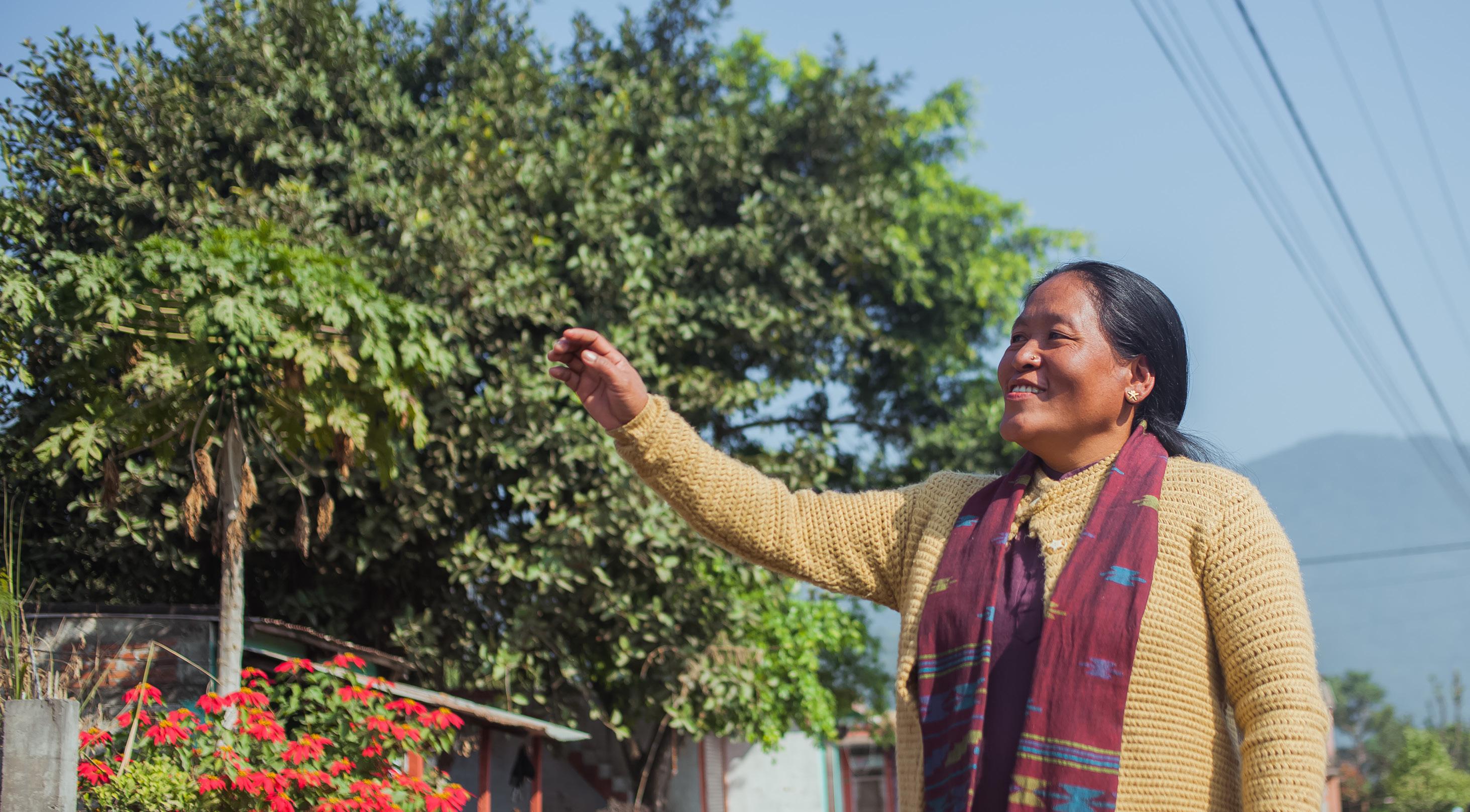

She credits a leadership development programme she participated in for nurturing the leader in her. The programme was implemented by UN Women through a consortium of six networks of excluded women.
The training became a source of political information for the women and helped develop their public-speaking skills. It highlighted issues of gender inequality to encourage women’s participation in formal institutions and the community, and helped enhance their leadership skills.
34
“In a society where women are only made to submit,” says Bhumisara, “programmes like this have paved the way for women from disadvantaged and marginalised communities to represent themselves in various community development initiatives, especially in the political sector.”
“At first, all the information overwhelmed us,” admits Bhumisara, “but it also got us interested in politics. We became aware of the planning processes at local levels and of the discriminatory gender norms and practices in our community. This information made us realise how crucial it was for women to be actively involved in decision making and politics.”
Bhumisara has since worked as a coordinator in the Ward Citizen Forum, a forum created to support community level decision making on development activities,wh ere she was involved in many social development projects. She is also a part of various women support groups and
women cooperatives and was recently elected as the chairperson of the Shree Devchuli Water Supply Consumer Committee.
“Bhumisara has become a driving force in our community, especially for women,” says Nirmala Kandel, another participant of the leadership development programme. “She makes it a point to include women in community development projects and is always willing to extend a helping hand to those in need without any reservations.”
Inspired by what Bhumisara has achieved, other women in her community are now more aware of their capabilities and rights. As a result, more women have started actively participating in community development activities.
“Because women are made to doubt themselves so much at every step that they tend to give up on their ambitions without even trying,” says Bhumisara. “I hope to encourage more women to join me in this pursuit of consolidating women’s position and status in the political scene.”

35
An Iron Resolve
“I did not shed a tear, or at least tried not to, as I cremated my husband’s body,” says 47-year-old Ek Maya B.K. In 2001, her husband, a sub-inspector in the Nepal Police, was killed in a crossfire between the police and the Maoist insurgents.
A mother of two young daughters, Ek Maya made a resolve that day. “I couldn’t just spend the rest of my life blaming fate and letting my children suffer. Giving in to my weakness was not an option.”

36
Women should aspire to excel in every field, become financially independent and stand against adversity if they are to raise their status in society.

37
Since then, Ek Maya made it her mission to advocate for women like herself whose lives had been gravely ravaged by the then ongoing insurgency. She started out as an active member of a single women’s network. As a social activist, she met facilitators of various social and political agencies. She also continuously supported the nationwide campaign for the victims of the insurgency.


“People started questioning my character and said I was ruining my family by involving myself in such affairs,” says Ek Maya. “But it didn’t matter. While helping others heal, I was also healing myself.”
Ek Maya was actively involved in a political party since 2003 but was not appointed to an influential position. “People looked at my shortcomings more than my capabilities,” she says. “No matter where I was, my gender became my disadvantage. When I voiced my opinions, others assumed it lacked substance.”
38
That changed after she participated in the political leadership training offered through a consortium of six networks of excluded women led by SAARC Business Association of Home Based Workers (SABAH) Nepal. The training brought women from marginalised communities or conflict-affected families to the forefront of the political sector. Ek Maya states that the programme gave her better understanding of gender inclusion in politics, laws and the government structure. “It also helped improve my public speaking skills and made it more effective.”
Ek Maya boldly challenged the party committee to approve her candidacy in the 2017 local elections. With no financial support, running an election campaign
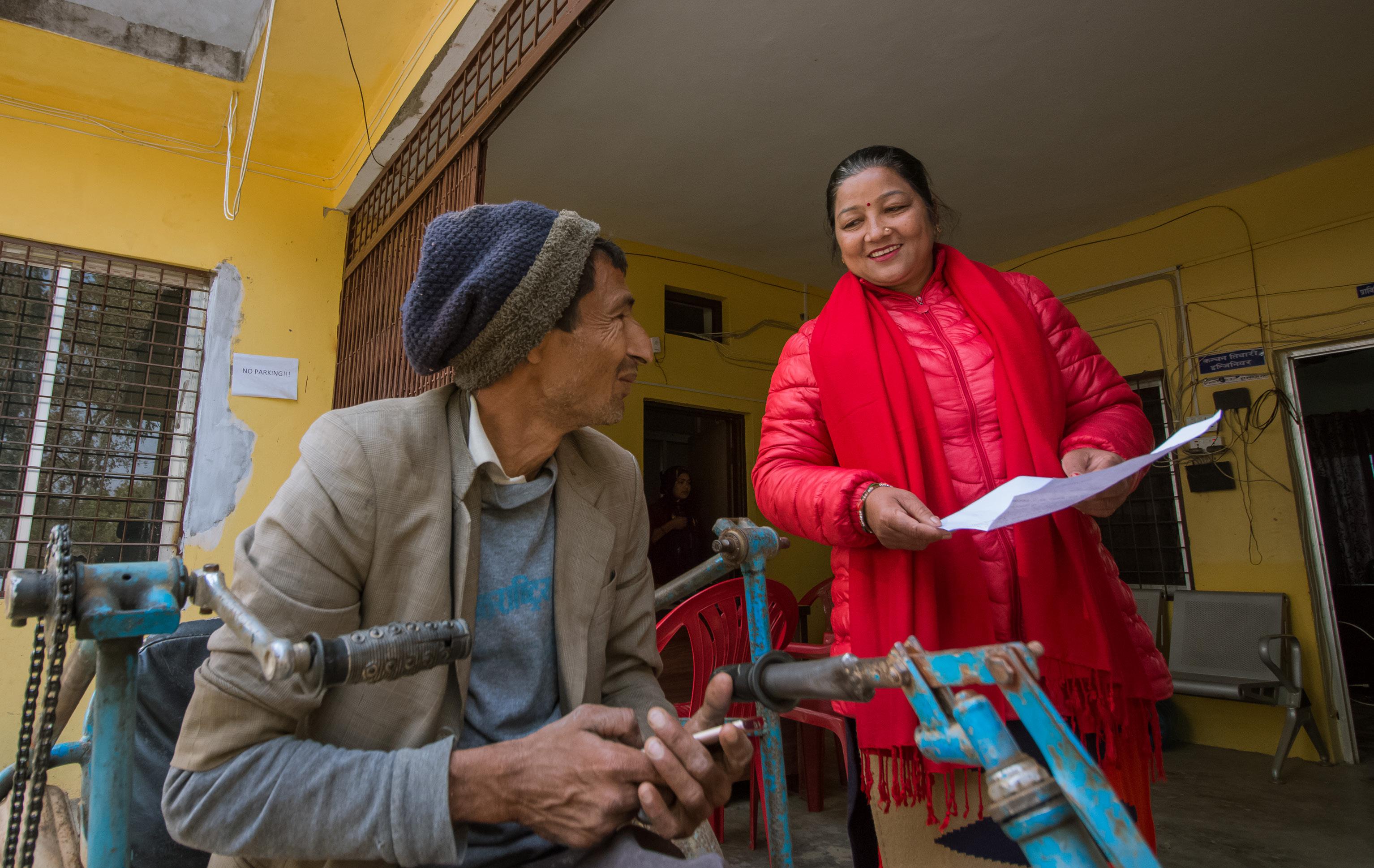
proved difficult. She sought support from the consortium to prepare an effective election campaign.
“I’m grateful to the programme for not only supporting me in developing my skills, but also for empowering me to take on new challenges.”
Ek Maya was elected as the vice chair of the Khajura Rural Municipality, Banke District, and is now a respected figure in her community. “Women should aspire to excel in every field and become leaders in their own right. Standing against adversity will substantially raise our status in society,” she remarks. Ek Maya wants to bring programmes to boost women’s empowerment in her community and hopes to create a healthy environment that enables more women to enter the political scene.
39
- Ek Maya with a constituent from her municipality
Advocating Change
It was only several months after the death of her husband that Laxmi Nepali came to know about his HIV infection. “Knowing the truth was like hitting the end of the road,” says Laxmi. She was 18 years old at the time, and a mother of a four-month-old baby, when she was infected. Fortunately, her infant son was safe.
That was nearly fifteen years ago. Since finding out about her infection, Laxmi has been working as a social mobiliser for the HIV-infected, spreading awareness about the condition and helping other HIV infected people like herself access financial and technical assistance. The 33-year old now lives a healthy life with her son at her parental home in Attaria, Kailali District.
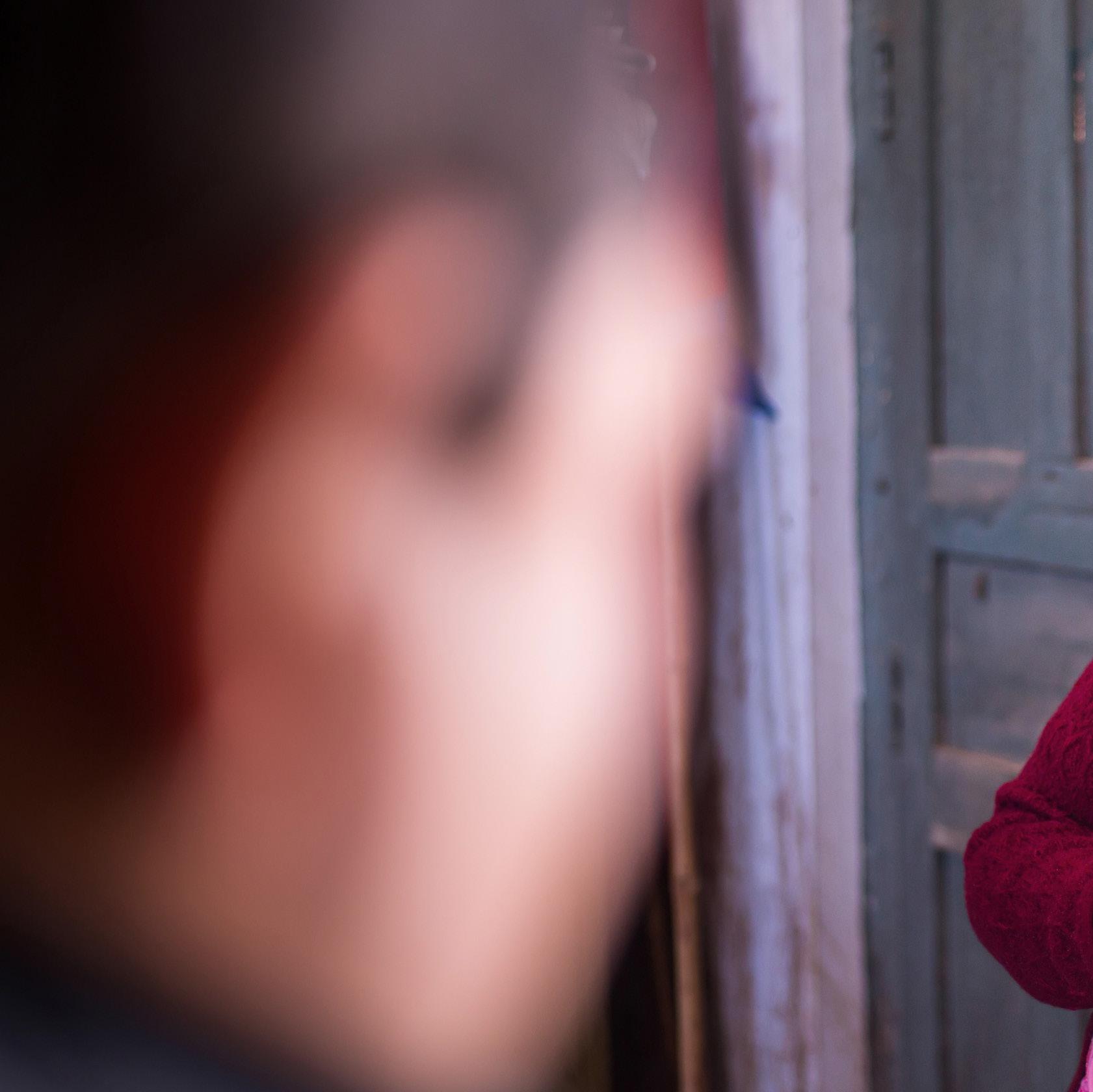
40
No amount of training is going to help us if we cannot make our voices heard in the places where it really matters.

41
Laxmi has come across many women who were subjected to a life of exclusion because of the stigma associated with HIV infection. Laxmi wanted to help empower these women so that they may have the confidence to lead positive, normal lives. Through a women’s organisation, she found out about a leadership training offered to excluded women.
“The leadership programme helped us become more aware about our rights,” says Laxmi. “Before participating in the programme, I did not know that the Government also had plans and policies for women and children in rural areas. It helped us realise the importance of voicing our concerns in the political front if we are to secure our rights and bring to the country’s attention the issues
faced by women like us.”
On knowing that the Government allocates money for women and children in every ward, Laxmi, together with other women, enquired about it in and successfully secured part of the allocated budget.
In her ward alone, the women’s group was able to secure NRs. 247,000 (approx. USD 2,250). The funds have been used to improve the livelihood of HIV-infected women by providing them with capacity and skills-building training.
“The women are also more self-reliant, confident and vocal about their issues now.”
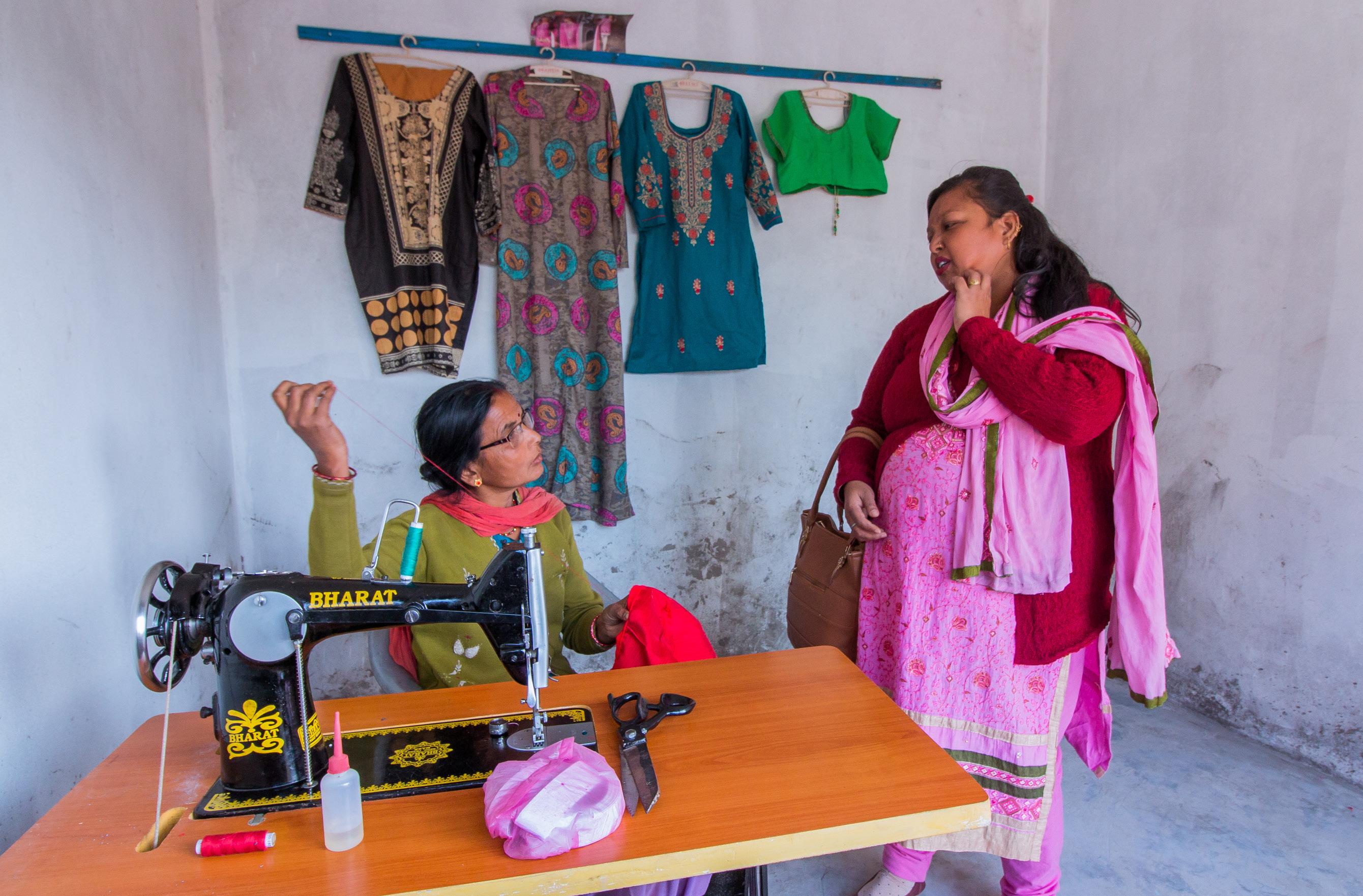
42
- Laxmi during her regular home visits as a social mobilizer
Laxmi has also since become a member of a political party upon completing the leadership training. “Until someone represents the voices of the communities, no one is going to understand our needs and problems,” she claims. She has also assisted two HIV-infected women from neighbouring wards in securing membership of a political party. “I believe this will inspire more women to follow their lead,” says Laxmi.
through programmes such as AWEE, and if the Government is able to move away from tokenism,” Laxmi hopes, “the situation will eventually get better.”
The development of leadership skills has empowered women in her community in various ways, not just in terms of politics, shares Laxmi. “We have been able to convince men to support women in the pursuit of their ambitions. Many have secured various positions in offices, and many have taken the lead to start their own small businesses such as tailoring and farming,” she says. “Although these changes might not seem considerable, they do add value to our efforts and give us credibility,” she adds.
Laxmi worries that the lack of family support and social recognition, and especially a lack of funds, might hinder the progress of many potential women leaders. “If women are provided more knowledge and skills to succeed,


43
- Laxmi lives with her mother, brother, sister-in-law and cousins
Advocacy and Communication for Change
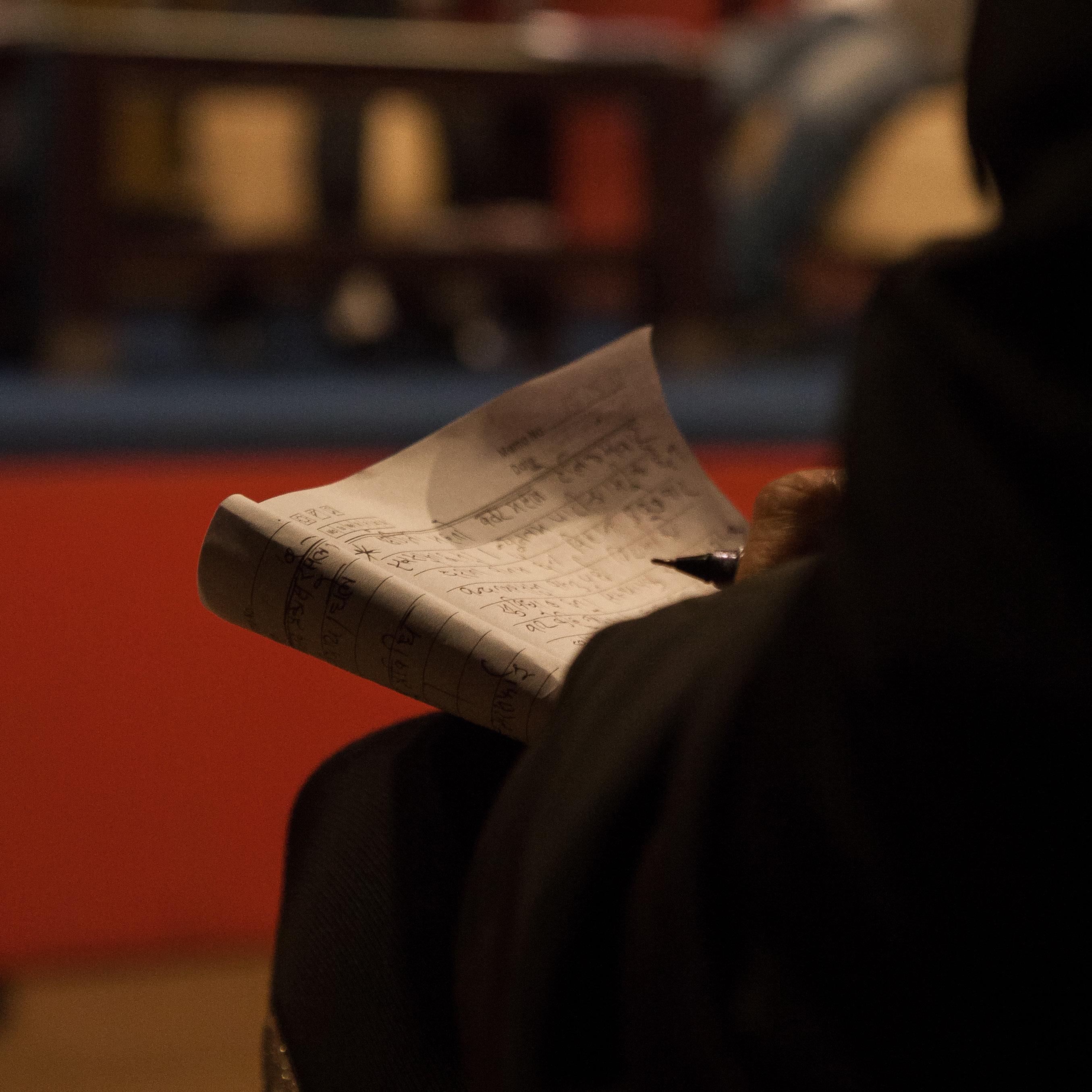
44
Advocacy and communication were critical components of the AWEE programme to raise awareness, increase political will and encourage increased resource allocation at national and sub-national levels to support women’s income generation and leadership. As part of the AWEE programme, UN Women launched the Sahi Ho! advocacy campaign community mobilisation to bring forth issues of gender inequalities, engage men and boys, stimulate inter-generational dialogues on gender equality and social inclusion and use mass media to raise public awareness. The campaign also contributed to UN Women’s other two interventions, namely, The Future We Want Project and Joint Programme on Accelerating Progress towards the Economic Empowerment of Rural Women with Food and Agriculture Organization, International Fund for Agriculture
Development and World Food Programme. The campaign was implemented in 12 UN Women’s programme districts*.
To identify the most effective legal, policy and investment frameworks to fast-track actions, policymakers must understand the ways women are economically engaged and the intersectionality of barriers they face. Therefore, evidence-based policy dialogues were facilitated at the national and local levels to solicit increased support and commitments for advancing gender equality and eliminating harmful practices.
At the local level, the campaign influenced individuals and communities to take actions for addressing gender discriminatory norms and practices by using mass media and creative communication approaches at the local level.
45
The social media campaign reached over 1.3 million people and directly engaged 68,000 people
A total of 11,629 people were directly engaged and mobilized through 23 advocacy events/activities as part of the Sahi Ho! advocacy campaign
*Kathmandu, Sunsari, Sindhuli, Sarlahi, Rautahat, Kavre, Sindhupalchowk, Makawanpur, Dhading, Nawalpur & Parasi, Banke and Kailali
Speaking Out
Menstruation was becoming unbearable for 16-year-old Ritu B.K. of Hetauda, Makwanpur District. To Ritu and her friends, getting their period in school always induced a moment of crucial decision—return home or risk the shame of being seen with stained clothing.
In Nepal, due to the lack of amenities like sanitary pads, clean water and functioning toilets in school, girls are discouraged from attending schools during their period. Girls use rags as they do not have access to menstrual hygiene products.

But why should we have to leave class, miss exams, be harassed or ashamed of ourselves every time we menstruate?
46

47
Since menstruation is considered a taboo subject, menstruating girls are reluctant to go to class to avoid being teased by boys. “But why should we have to leave class, miss exams, be harassed or be ashamed of ourselves every time we menstruate?” questions Ritu. Even parents and guardians of young girls believed that staying home was the only proper thing to do, since menstruating girls are considered untouchable. However, with the growing intervention of many awareness programmes at the community level, voices were gradually

being raised against such issues in Ritu’s community. Equal Access International, with UN Women’s support, had staged an awareness-raising drama production in Ritu’s school—Mero Samarthan Unlai Sahayog (My Solidarity to her Support)— highlighting the adversity faced by women, such as physical violence, mental abuse, gender inequality and inaccessibility of opportunities for work and education.
The drama, performed by the school’s students, was highly appreciated. More importantly, it inspired the participating young girls to express their problems without fear or shame.
48
It was during this programme that Ritu, a grade 10 student, noticed an opportunity to bring up concerns regarding menstrual health to the authorities. “I saw this event as an appropriate platform to highlight the difficulties faced by my friends and I during menstruation,” says Ritu. She approached the Ward Chair and informed him about the issue. Having heard about the challenges faced by Ritu and her friends, the Ward Chair pledged to solve the problem within a month.

Ritu’s initiative made a big impact. “Thanks to Ritu’s courageous act, the school now receives a regular supply of sanitary pads from the ward office,” informs Yograj Khatiwada, Ritu’s school principal. New toilets are also being constructed.
Following the success of Ritu and her friends, the support for sanitary pads has extended to all 52 secondary and higher secondary public schools in Hetauda under the ward office’s initiation.

49
problems.
Dialogues for Gender Sensitive Plans and Policies
Samakon is a popular panel discussion TV show that brings local and nationallevel leaders face-to-face with an audience to tackle pressing issues.

Trade union works best when it can bring people together to address their
- Beli Maya Ghale
50
Trade Union activist and member, Provincial Assembly-3

We need our workers to stay away from the illegal routes so that we can control the damage.
51
- Bimal Prasad Srivastav Chairperson, Industry and Commerce, Labour and Consumer Welfare Committee
Two panel discussions with relevant experts, stakeholders and audiences were organized on, (i) issues faced by women migrant workers and (ii) gender responsiveness of the Labour Act 2017. The discussion was organized as part of the Sahi Ho! campaign, in collaboration with Samakon*, a popular TV panel discussion show. The show brought together local and nationallevel leaders face-to-face with the in-studio audience to tackle pressing issues of migration and women working in the formal and informal sectors.
The first discussion was on the issues of women migrant workers. The discussion focused on the heightened risk to Nepali women. Some of the participants shared that mostly women choose to go for foreign employment through irregular channels due to unequal foreign employment policies. Leaders such as Bimal Prasad Srivastav, Chairperson of Industry and Commerce, Labour and Consumer Welfare Committee of the Parliament; and Dilip Kumar Chapagain, Director General at the Department of Foreign Employment, participated in the panel
alongside human rights activist Manju Gurung. Some of the key issues raised by the audience were: (a) challenges women face due to frequent policy changes on foreign employment; (b) increased vulnerability to trafficking and labour exploitation among women due to lack of a gender-friendly policy environment; and (c) lack of employment opportunities and remedial efforts for vulnerable women.
The second discussion on the gender responsiveness of the Labour Act 2017 featured Beli Maya Ghale, a Trade Union activist and member of Provincial Assembly-3; Udaya Kumar Gupta, Chief of Department of Labour and Occupational Safety; and Prakash Rasaili from the House of Representatives. Some of the key issues raised were; (a) workers being denied of the minimum wage salary (NPR 13,000, equivalent to USD 114.11), (b) lack of an appointment letter from contractors, making women vulnerable to exploitation by employers, (c) lack of maternity leave and other benefits, and (d) gaps in implementation of the Labour Act.

52
Across all formal sectors, an employee, regardless of their gender, is entitled to a basic salary of NRs. 13,450.
- Udaya Kumar Gupta
Chief, Department of Labour
*Samakon is produced by Sancharika Samuha, a forum of women journalists in Nepal, and airs on Kantipur Television every Friday and brings forth issues of genderbased discrimination and violence, alongside social biases and structural barriers that hinder women.
UN Women is the UN organization dedicated to gender equality and the empowerment of women. A global champion for women and girls, UN Women was established to accelerate progress on meeting their needs worldwide.
UN Women supports UN Member States as they set global standards for achieving gender equality, and works with governments and civil society to design laws, policies, programmes and services needed to implement these standards. It stands behind women’s equal participation in all aspects of life, focusing on five priority areas: increasing women’s leadership and participation; ending violence against women; engaging women in all aspects of peace and security processes; enhancing women’s economic empowerment; and making gender equality central to national development planning and budgeting. UN Women also coordinates and promotes the UN system’s work in advancing gender equality.
53
UN Women Nepal County Office House No. KA 1/333 Thapathali Heights Kathmandu, Nepal Tel: +977-1-14255110 / 4216028 www.nepal.unwomen.org @unwomennepal
UN WOMEN’S MANDATE

 Government of Nepal Ministry of Women, Children and Senior Citizen
Government of Nepal Ministry of Women, Children and Senior Citizen












 8. Laxmi Nepali Advocating Change p40-43
7. Ek Maya B.K. An Iron Resolve p36-39
6. Bhumisara Ale Magar Women at the Frontlines p32-35
5. Chandra Kala Rai Never Back Down p28-31
9. Ritu B.K. Speaking Out p46-49
10. Dialogues for Gender Sensitive Plans and Policies p50-52
8. Laxmi Nepali Advocating Change p40-43
7. Ek Maya B.K. An Iron Resolve p36-39
6. Bhumisara Ale Magar Women at the Frontlines p32-35
5. Chandra Kala Rai Never Back Down p28-31
9. Ritu B.K. Speaking Out p46-49
10. Dialogues for Gender Sensitive Plans and Policies p50-52





















































 Government of Nepal Ministry of Women, Children and Senior Citizen
Government of Nepal Ministry of Women, Children and Senior Citizen
